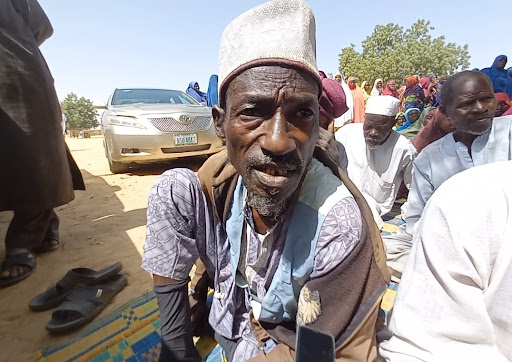IDPs Struggle With Hunger And Fear, As Boko Haram Conflict Persists
As authorities struggle to contain the Boko Haram insurgency, the government seems to be at a loss on sustaining the free feeding program it started close to a decade ago.

The life of a father of eight children living in one of the Internally Displaced Person (IDP) camps in Maiduguri, Northeast Nigeria, unable to feed himself, let alone his family in the absence of food stamps and as a result, sends most of his children away to cater for themselves, is becoming common.
The implications of this action by Muhammad Dantarafi, a 60-year old internally displaced fish farmer from Baga, has dire consequences on the children and the society as a whole. This is sadly the story of most families displaced by the prolonged, brutal Boko Haram insurgency.
Dantarafi’s community, Doro, was attacked by Boko Haram, forcing him and other kinsmen to flee into Niger Republic. There, they had a brief stay as refugees before further attacks forced them to flee back to Nigeria.
Since then, Dantarafi, who used to have a thriving farming and fishing business had lost everything that gave him some relative comfort in life and now lived a dismal life in the camp. Currently, he chews kola nuts in place of food when he’s hungry.
“In Baga, I cultivate different crops, and I also do commercial fishing. That has been my lifelong occupation which we inherited from our parents before Boko Haram forced us to live in this camp.
“I’ve been in the IDP camp for the past seven years. But in the past eight months, the situation here has been very unbearable. Nothing to eat or drink. Hunger takes over every home here – to the extent that we cannot even come to support each other. The last seven years in this camp had been filled with soul depressing experiences, with hunger and total lack of what to eat or feed the family becoming a norm to many of us,” he said.
The attack on Baga and many other islands of Lake Chad had brought about a drastic change in the lives of his family.
“Even as I am speaking to you this afternoon, it may or may not surprise you that I have not tasted food, either in its solid or liquid form since the morning of yesterday,” Dantarafi said as he munched on a kola nut.
“The kola nuts that you see me chewing now are a substitute for food to me. I chew a little and wash it down with water,” he added with a dry smile.
Dantarafi said his wife and some of his children still depend on him for survival.
“I have sent some of the children to Damagum in Yobe State to study the Holy Quran as Alamajirai,” he said.
“At least by being there they would be free to go about their studies and look for what to eat on their own. None of my kids are in any Western school because I do not have the means of feeding them, talk more of paying their fees for western education.”
He said the survival strategy in the camp before things became so difficult was going to people’s farms to work for stipends.
“Sometimes when it was safe we would all go to the nearby bushes to fetch some vegetable that we boil and eat, or help the women to fell firewood to sell.
“The NGOs have stopped coming and we recently heard that the state government had warned them never to bring food for us because they want to return IDPs to their reclaimed communities.
“No one has come to tell us that we would soon be leaving, yet they have stopped bringing the monthly support that comes in the form of cash,” he said.
Baga, a commercial town in Kukawa local government is one of the communities that has been badly affected by the ongoing Boko Haram conflict in Borno State.
The government of the state had last year taken some of the IDPs from Kukawa LGA to Kukawa and Kross-Kauwa villages all around Baga town. But remote island settlements like Doron-Baga, Doron-Gowon, and other Tumbuls patchy settlements have not been certified for return as ISWAP terrorists still hold forte in those swampy fishing terrains.
Support Our Journalism
There are millions of ordinary people affected by conflict in Africa whose stories are missing in the mainstream media. HumAngle is determined to tell those challenging and under-reported stories, hoping that the people impacted by these conflicts will find the safety and security they deserve.
To ensure that we continue to provide public service coverage, we have a small favour to ask you. We want you to be part of our journalistic endeavour by contributing a token to us.
Your donation will further promote a robust, free, and independent media.
Donate HereStay Closer To The Stories That Matter




